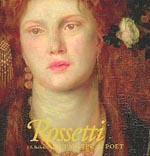Book Reviews: Books on Dante Gabriel Rossetti
Three books about the life of Pre-Raphaelite Dante Gabriel Rossetti are a fascinating insight into his complex life


Exquisite houses, the beauty of Nature, and how to get the most from your life, straight to your inbox.
You are now subscribed
Your newsletter sign-up was successful
To order any of the books reviewed or any other book in print, at
discount prices* and with free p&p to UK addresses, telephone the Country Life Bookshop on Bookshop 0843 060 0023. Or send a cheque/postal order to the Country Life Bookshop, PO Box 60, Helston TR13 0TP * See individual reviews for CL Bookshop price
Biography Rossetti: His Life and Works Evelyn Waugh (Penguin Classics, £20, *£16)
Rossetti: Painter & Poet J. B. Bullen (Frances Lincoln, £35, *£31.50)
The Rossettis in Wonderland: A Victorian Family History Dinah Roe (Haus Publishing, £17.99, *£16.19)
Perhaps, reading between the lines of Evelyn Waugh's Rossetti: His Life and Works, we learn as much about its author as we do about its subject. Just before he wrote it in 1928, Waugh admitted to a friend that sometimes, late in the evening ‘when firelight and rum and loneliness have done their worst', he found himself identifying too closely for comfort with Rossetti, who, by the end of his life, was addicted to chloral, which he took to help him sleep, and half mad.
Dante Gabriel Rossetti-painter, poet and co-founder of the Pre-Raphaelite Brotherhood is one of the most mysterious and compelling personalities of the Victorian era. His life story is a gift to any writer and, since his death in 1882, a constant stream of them has tried to explain him to successive generations of readers. Ruskin suggested that ‘he was really not an Englishman, but a great Italian tormented in the Inferno of London', which was romantic nonsense.
Exquisite houses, the beauty of Nature, and how to get the most from your life, straight to your inbox.
His father, Gabriele, was a political refugee, but, as Dinah Roe makes clear in her lively joint biography, Rossetti and his siblings (who included Christina Rossetti, the author of Goblin Market) were Londoners through and through, and loved the city. In his handsome, profusely illustrated book, J. B. Bullen gives Rossetti's poetry as much attention as his pictures and, in his work as well as his life, finds erotic obsession and a debilitating struggle to reconcile sensual with spiritual passion. Both books are excellent but neither is quite as much fun as Waugh's.
Waugh brought no experience as an art historian or critic to the task when he was commissioned to write a biography for the centenary of Rossetti's birth. A bumptious, 25-year-old drunkard, he had not yet written any of the books that would soon make his name (the funniest, but also some of saddest of the 20th century), but he clearly already knew how to write a character and tell a story. There are times, it is true, when his inexperience shows through: times when he fails to resist the temptation to be amusing when he had better have kept a straight face; times, too, when he cannot decide whether the book he is writing is a serious re-evaluation of Rossetti or merely a gesture of fogeyish defiance, a huge tease directed at Bloomsbury pundits such as Clive Bell and Roger Fry, designed to annoy people he dismissed as ‘hatless and dishevelled' Modernists (‘only the young dare to be out of date,' commented a reviewer in The Spectator).
On the whole, however, it is a testament to what raw talent, buffed-up by public school and Oxford, can achieve. It has been out of print for many years, available only in scarce, collectable editions, some of which can change hands for almost £1,000. Its re-issue as the first volume in a new 24-book set from Penguin Classics, putting it back within reach of the general reader, is an event to be celebrated with fireworks, bunting and marching bands.
Country Life is unlike any other magazine: the only glossy weekly on the newsstand and the only magazine that has been guest-edited by His Majesty The King not once, but twice. It is a celebration of modern rural life and all its diverse joys and pleasures — that was first published in Queen Victoria's Diamond Jubilee year. Our eclectic mixture of witty and informative content — from the most up-to-date property news and commentary and a coveted glimpse inside some of the UK's best houses and gardens, to gardening, the arts and interior design, written by experts in their field — still cannot be found in print or online, anywhere else.
